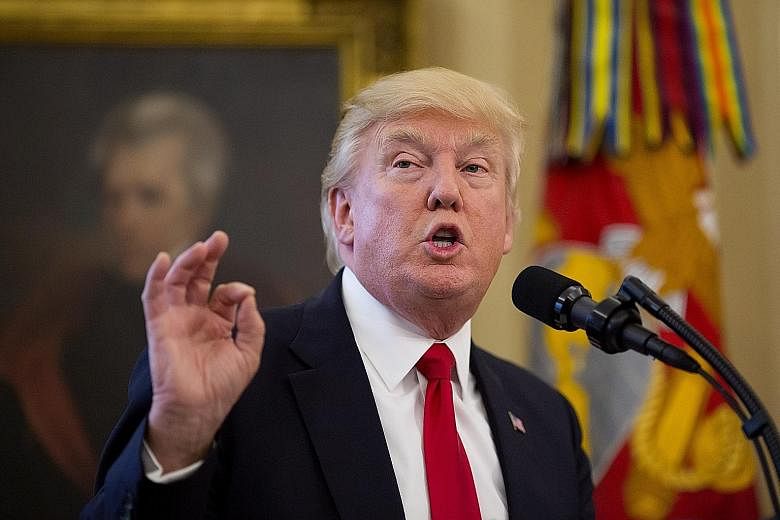President Donald Trump's threat to go it alone to address North Korea's nuclear programme if China does not help the US out is little more than a negotiation strategy, analysts in China and the region say.
"It's an asking price" ahead of the summit meeting later this week between Mr Trump and Chinese President Xi Jinping, said Professor Jin Canrong of Renmin University in Beijing.
Concurring, Keio University's Dr Ken Jimbo said the rhetoric was intended at "pressuring China to take a bold action towards North Korea, based on his belief that China, if serious enough, can curb North Korea's nuclear development".
He added: "The main goal is not declaring US unilateral engagement in North Korea."
In an interview with the Financial Times published on Sunday, Mr Trump had said the United States can address North Korea's nuclear threat unilaterally if China does not cooperate to rein in the North.
"If China is not going to solve North Korea, we will. That is what I am telling you," Mr Trump was quoted as saying. While refusing to say more on what the US might do, he said it could deal with the North "totally", without Chinese help.
Major South Korean newspapers yesterday carried news of Mr Trump's interview, with English daily The Korea Herald, noting in an editorial that the US is "putting pressure on Beijing to do its due role to resolve North Korea's nuclear and missile threats" and hoping that "Xi should make the right choice".
International relations professor Park Ihn Hwi of Ewha Womans University said Mr Trump's declaration was meant to put him in a "better negotiation position" with China, and to justify future US actions, including the deployment of a missile defence system to defend South Korea from the North, to which China has vehemently objected, saying it hurt its security interests.
Since taking office in January, Mr Trump has accused Beijing of not doing enough to rein in Pyongyang, which tested two nuclear devices last year and has been testing ballistic missiles with increasing frequency and success.
There is talk that it will conduct a nuclear test this week, possibly during the Trump-Xi summit.
US Secretary of State Rex Tillerson, on his visits to Japan and South Korea last month, declared that the "strategic patience" of the previous administration in dealing with Pyongyang was over and that "military action" was an option.
Because of this, some analysts, including defence expert Tosh Minohara of Kobe University, believe Mr Trump's words are not all bluster.
Saying the likelihood of a unilateral strike by the US was "quite high", Dr Minohara also warned: "Mr Trump needs to realise he can't strike all of North Korea's missiles at one go - several will remain and while they probably cannot reach the US, they can reach South Korea and Japan for sure."
Professor Jia Qingguo of Peking University is of the same view, adding that Seoul would find such a move unacceptable.
Chinese analysts believe Mr Xi would respond to US demands for more action by agreeing to more sanctions against North Korea.
China would again suggest the suspension of nuclear and missiles testing on Pyongyang's side and the halting of large-scale military exercises on the part of Washington and Seoul, so that multilateral talks could resume, said Prof Jin.
Separately, Chinese State Councillor Yang Jiechi spoke with Mr Tillerson on Sunday, saying the upcoming leaders' summit was a "top priority" for bilateral ties.
China hopes the two sides will meet each other halfway to ensure the success of the meeting, Mr Yang was quoted by Xinhua news agency as saying.
•Additional reporting by Chang May Choon and Walter Sim
SEE OPINION

